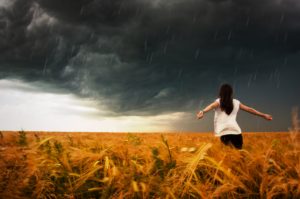If the first takeaway from creation theology is that we’re all, male and female, in the image of God, despite our sinfulness and our damaged state, then we ought to figure out what that means.
What is the image of God, anyway?
I think the first hint toward an answer is in the text itself. As God meditates on what he’s going to do (Gen 1.26), and as Moses then describes what God did (Gen 1.28), the text emphasizes a single point: Adam is to have dominion “over all the earth,” including “every living thing that moves on the earth.” He is to fill the earth with descendants of himself (Gen 1.28), and these humans are to “subdue” the earth in their dominion over it.
So what’s that mean?
Several things:
- God has given us responsibility for the state of the earth. We’re going to be accountable for how we use it. It’s not our playground; it’s our responsibility. That means we need to use it wisely and, dare I say it, sustainably. We should use our non-renewable resources with a view toward how long they’ll last at the current rate of use. We should prefer renewable resources wherever possible—and we should carefully think through what “possible” means, in both practical and financial terms. We should develop smart ways to conserve and extend what’s on and in the earth. Avoidable extinctions shouldn’t happen on our watch. We’re not drunken sailors—or we shouldn’t be.
- And with the responsibility to use the earth wisely is the clear right to use it. Its resources are for our use, within the bounds of stewardship. We can harness the power of its energy sources; we can use our intelligence to make plants more productive or more useful in other ways (natural isn’t necessarily a more moral descriptor); we can domesticate animals and use them for work or for food, even as we care for them and seek their prosperity (Prov 12.10). We can kill them, but we do so humanely and only as needed.
And that brings other issues to consider:
- Are there limits to this dominion? Selective breeding? Hybridization? Genetic manipulation? Cloning? What about cloning humans? Does that cross a line? How do we define the line?
- Does our dominion extend beyond the earth? Space travel? Mining asteroids? How do we decide?
- Does our dominion extend to “redeeming culture” in the Kuyperian sense? Should we embrace all cultural forms as morally neutral and exploit them for the advancement of the kingdom? What constraints would a biblical view place on that kind of activity?
The longer God gives us to steward the planet, the more complicated the questions get. Turns out we need to steward the questions about stewarding, as well as all the other stuff. Being in the image of God is serious business, and it requires us to know more about him than what he has revealed in us; we need to master the revelation he gives in his Word if we’re going to steward our dominion over the earth in ways that consistently please him.
Responsibility is hard work.
Next time, we’ll ask whether there’s more to the image than just dominion.
Part 5 Part 6 Part 7 Part 8 Part 9


Timothy Kain says
Good stuff!